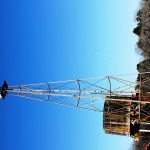Free testing for private water well owners in Hurricane Harvey flood area
Contacts: Dr. Diane Boellstorff, 979-458-3562, [email protected]
Dr. Drew Gholson, 979-845-1461, [email protected]
John W. Smith, 979-845-2761, [email protected]
COLLEGE STATION — The Texas A&M AgriLife Extension Service and others are collaborating to offer multiple well-water testing opportunities after Hurricane Harvey left potential contamination in its wake.
Residents who have private water wells in the area affected by flooding from Hurricane Harvey should assume their water is contaminated and have it tested, said Dr. Diane Boellstorff, AgriLife Extension water resource specialist, College Station.
Boellstorff said water from a flooded well should not be used for drinking, cooking, making ice, brushing teeth or even bathing until it is tested.

To help residents in the affected area determine if their well water is contaminated, AgriLife Extension is being joined by Virginia Tech and the Rural Community Assistance Partnership to offer free well water testing in several southeast Texas counties.
Residents can pick up a free water sampling test kit from their local AgriLife Extension office or other designated location, but must be able to return the sample to the AgriLife Extension office from 8-11 a.m. on the designated collection date.
Instructions are included with the kits and only one sample kit will be provided per household. There are a limited number of kits, which will be distributed on a first-come, first-served basis.
The sample kit pick-up locations, start dates for obtaining kits and collection dates are as follows:
— Jefferson County: AgriLife Extension office, 1225 Pearl St., Suite 200, Beaumont. Kits available starting Sept. 14. Collection date is Sept. 25.
— Victoria County: AgriLife Extension office, 528 Waco Circle, Victoria. Kits available starting Sept. 15. Collection date Sept. 21.
— Hardin and Orange counties: AgriLife Extension office, 440 W. Monroe St., Kountze. Kits available starting Sept. 15. Collection date is Sept. 27.
— Wharton County: AgriLife Extension office, 315 E. Milam St., Suite 212, Wharton. Kits available starting Sept. 14. Collection date Sept. 18.
— Liberty County: Kits available Sept. 16 from 8:30 a.m.-noon at the Disaster Assistance Workshop, Raywood Livestock Market, 14810 U.S. Highway 90 E. in Raywood. Kits also available at the AgriLife Extension office, 501 Palmer Ave. in Liberty, on Sept. 18-19. Collection at the AgriLife Extension office on Sept. 20.
–Colorado County: AgriLife Extension office, 316 Spring St., Columbus. Kits available starting Sept. 18. Collection date is Sept. 21.
— Chambers County: AgriLife Extension office, 295 White Memorial Park Road, Anahuac. Kits available starting Sept. 20. Collection date is Sept 27.
The test kits are being distributed in these locations, but any homeowner with a private water well in the flood-affected area is eligible to have well water tested. The samples will be analyzed for coliform bacteria by Virginia Tech. Water quality results will be confidential and will be emailed or mailed to residents’ homes.
Boellstorff, who is in Texas A&M University’s soil and crop sciences department, said floodwater might contain substances from upstream, such as manure, sewage from flooded septic systems or wastewater treatment plants or other contaminants. A septic system near a well also can cause contamination when the soil is flooded.
“Data from the well water testing will help us better understand a flood’s impact on private wells and help us enhance our communications relating to well water quality,” she said.
Instructions for decontaminating a well are available through the following publications free for download at http://twon.tamu.edu/fact-sheets/: Decontaminating Flooded Water Wells and Shock Chlorination of Wells.
Drew Gholson, AgriLife Extension program specialist and network coordinator, College Station, said wells should also be inspected for physical damage and signs of leakage after a flood.
“If it appears damaged, consult a licensed water well contractor to determine whether repairs are needed,” Gholson said.
He also noted flooding can damage the well pump and electrical systems.
“If the pump and/or electrical system has been underwater and it is not designed to be under water, do not turn on the pump as there is a potential for electrical shock or damage to your well or pump,” he said.
Gholson said once floodwaters have receded and the pump and electrical system have dried, have a qualified electrician, well driller or pump installer check the wiring system and other well components.


